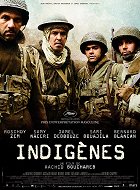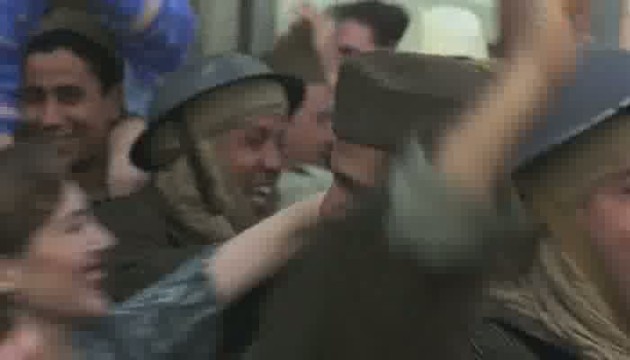Réalisation:
Rachid BoucharebPhotographie:
Patrick BlossierActeurs·trices:
Jamel Debbouze, Samy Naceri, Roschdy Zem, Sami Bouajila, Bernard Blancan, Assaad Bouab, Mélanie Laurent, Aurélie Eltvedt, Mohamed Majd (plus)Résumés(1)
En 1943, alors que la France tente de se libérer de la domination nazie, le parcours de quatre "indigènes", soldats oubliés de la première armée française recrutée en Afrique. Abdelkader, Saïd, Messaoud et Yassin, réputés pour leur courage, sont envoyés en première ligne. Argent, amour pour la France ou pour l'armée française, foi en la liberté et l'égalité, leurs motivations divergent pour un même combat, libérer la France, les armes à la main. (Belga Films)
(plus)Vidéo (1)
Critiques (2)
Film politiquement correct et historiquement équilibré dans l'ensemble. Les habitants d'origine des colonies nord-africaines se joignent à l'armée française pour libérer leur "propre" patrie, que la plupart d'entre eux n'ont jamais visitée - les créateurs du film, bien qu'ils se soient clairement concentrés sur la description du courage et de la conscience patriotique des musulmans dans le cadre de leurs remerciements (historiquement tardifs), n'ont pas oublié de mentionner également de manière marginale le côté obscur de la participation des "Marocains", etc., aux fronts européens - vols, viols. Les scènes de combat ne sont en aucun cas choquantes. C'est ironique que ceux qui avaient placé leur espoir de liberté et d'égalité dans la coopération avec les Français pendant la Première Guerre mondiale aient dû se battre eux-mêmes pour obtenir leur liberté définitive dans les années 50 et 60, précisément contre eux.
()
The units of free France were mostly composed of indigenous men from French colonies, where the influence of the Vichy government did not reach. This fundamental truth was rarely seen in French historical consciousness or in the artistic sphere, especially after the bitter experience of the Algerian War. However, France had a debt not only to war veterans from World War II but certainly one even greater to Arab loyalists known as harkis, who supported France during the Algerian conflict and faced the worst after France's defeat. Even those who received asylum in France were second-class citizens. During World War II, the French administration certainly did not treat its soldiers equally. Even worse conditions were present in the American army, where there was harsh racial segregation, which was only not applied in the American Navy. So it is not surprising that when a film with a similar theme was created many decades later, it became a social event widely commented on by most media, with members of parliament and political leaders participating in the film premiere. France has a completely different birth rate dynamic nowadays, and the ethnic composition is rapidly changing in favor of the Arab element. For the same social reasons, the film was soon nominated for an Oscar, because considering the quality of the film, there could be nothing else behind it. The screenplay is quite average, just like the direction, and the film was created to address the issue of racism in a somewhat didactic manner, rather than truly entertaining the audience. The action is slow-paced and at times one cannot help but feel bored. Perhaps the most interesting aspect is the presence of Jamel Debbouze, a popular actor and presenter, who suffered a serious accident in childhood and lost his hand. Notice that in a significant role, he never takes his hand out of his pocket and only fights with a pistol. This is not apparent in any other film, but here, given the genre, it is quite obvious. Overall impression: 45%.
()



Annonces